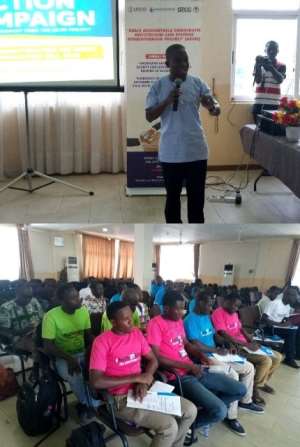
The Social Enterprise Development Foundation of West Africa (SEND - Ghana), a Non-Governmental Organization (NGO) has organised a day's workshop to equip journalists in the Upper East Region with the requisite knowledge on the Right to Information (RTI) bill.
The programme which brought together about 20 journalists from different media outlets, was to enable them use their platforms to engage both duty bearers and citizens to advocate the passage of the bill.
Mr Mumuni Mohammed, the Programme Officer of SEND - Ghana in the Northern Region, said it was organised in collaboration with the Ghana Integrity Initiative (GII), the Ghana Anti-Corruption Coalition (GACC) which formed a consortium known as the GII consortium.
He said it was a four-year anti-corruption project dubbed: 'Accountable Democratic Institutions and Systems Strengthening (ADISS),' with funding support from the United States Agency for International Development (USAID), and added that it was implemented across all ten regions of country.
Ms Rachel Gyabaah, Programme Officer of SEND - Ghana in Accra, who took participants through the RTI bill, said there were some that needed to be considered in the draft bill, 'we have a clause which says that information going to the office of the President, this is too broad, who at the office of the President? some of these things should be worked on because once it is left to the discretion of an individual then there is a challenge.'
According to her, some of the clauses which do not show specifics would undermine the whole essence of the bill, adding that 'if you are going to leave issues to the discretion of an individual, the individual would determine what should be identified as what.'
Citing Article 89 of the drafted bill which talks about the private sector, Ms Gyabaah said 'if clause 91 can be clear and specific on which private sectors are identified, which private sectors are included so that everything is clear, because per international standards, is supposed to be specific.'
She insisted that exemptions were supposed to be narrow and specific so that three people at least could read and have the same understanding, and indicated that clause 17 was only when you apply the HARMS TEST.
'The HARMS TEST is more like asking, is it going to cause harm to the beneficiary or the keeper of the information, so it is also left with an individual to apply the HARM TEST', she said, and stressed that 'the HARMS TEST is not enough to say that it addresses all the issues under the exemption.'
Ms Gyabaah on behalf of the RTI Action Campaign team and stakeholders in various sectors pushing for the passage of the bill, thanked Parliament for considering some proposals by the team, and appealed for consideration of other proposals before the bill was passed, 'so that we do not have a bill which every clause needs to go back for interpretation, and not have a bill that does not give power to the citizens as we are demanding.'
Mr Nicholas Azebire, a Broadcast Journalist at Tanga Radio, a local station in the Bolgatanga Municipality in an interview with the Ghana News Agency (GNA), described the workshop as informative and educative.
He said practising as a journalist in the Upper East Region had not been easy because accessing information from the appropriate quarters to feed the public was 'tedious,' and added that the passage of the bill would boost the work of journalists and further whip up interests among citizens to participate in issues of national concern.
Mr Ebo Bruce-Quansah, a Journalist with the Daily Guide Newspaper, said the programme was educative and had re-awoken his spirit to advocate the passage of the bill into law.




 Lay KPMG audit report on SML-GRA contract before Parliament – Isaac Adongo tells...
Lay KPMG audit report on SML-GRA contract before Parliament – Isaac Adongo tells...
 Supervisor remanded for stabbing businessman with broken bottle and screwdriver
Supervisor remanded for stabbing businessman with broken bottle and screwdriver
 NDC watching EC and NPP closely on Returning Officer recruitment — Omane Boamah
NDC watching EC and NPP closely on Returning Officer recruitment — Omane Boamah
 Your decision to contest for president again is pathetic – Annoh-Dompreh blasts ...
Your decision to contest for president again is pathetic – Annoh-Dompreh blasts ...
 Election 2024: Security agencies ready to keep peace and secure the country — IG...
Election 2024: Security agencies ready to keep peace and secure the country — IG...
 People no longer place value in public basic schools; new uniforms, painting wil...
People no longer place value in public basic schools; new uniforms, painting wil...
 'Comedian' Paul Adom Otchere needs help – Sulemana Braimah
'Comedian' Paul Adom Otchere needs help – Sulemana Braimah
 Ejisu by-election: Only 33% of voters can be swayed by inducement — Global InfoA...
Ejisu by-election: Only 33% of voters can be swayed by inducement — Global InfoA...
 Minority will expose the beneficial owners of SML, recover funds paid to company...
Minority will expose the beneficial owners of SML, recover funds paid to company...
 Prof. Opoku-Agyemang has ‘decapitated’ the NPP’s strategies; don’t take them ser...
Prof. Opoku-Agyemang has ‘decapitated’ the NPP’s strategies; don’t take them ser...
